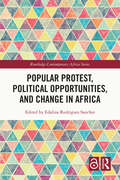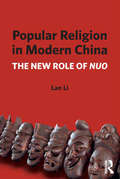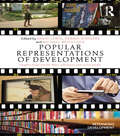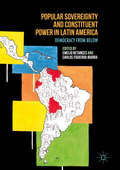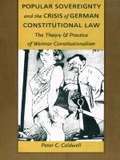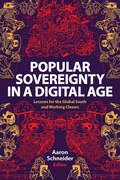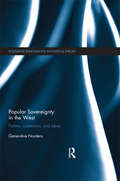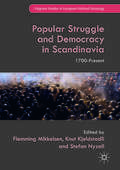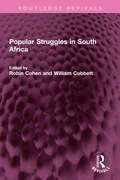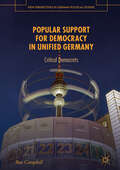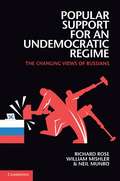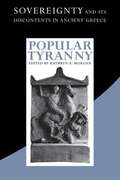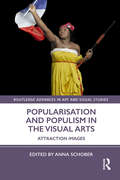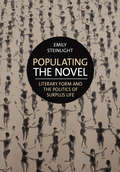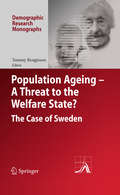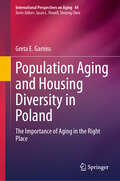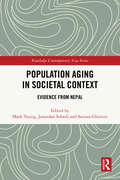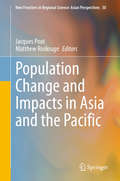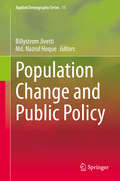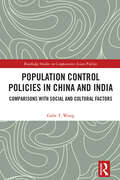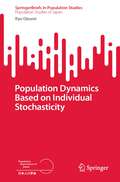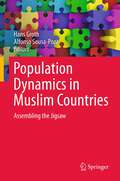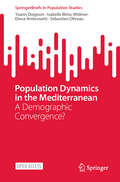- Table View
- List View
Popular Protest, Political Opportunities, and Change in Africa (Routledge Contemporary Africa)
by Edalina Rodrigues SanchesThis book offers a fresh analysis of third wave popular protests in Africa, shedding light on the complex dynamics between political change and continuity in contemporary Africa. The book argues that protests are simultaneously products and generators of change in that they are triggered by micro-and-macrosocial changes, but they also have the capacity to transform the nature of politics. By examining the triggers, actors, political opportunities, resources and framing strategies, the contributors shed light onto tangible (e.g. policy implementation, liberal reforms, political alternation) and intangible (e.g. perceptions, imagination, awareness) forms of change elicited by protests. It reveals the relevant role of African protests as engines of democracy, accountability and collective knowledge. Bringing popular protests in authoritarian and democratic settings into discussion, this book will be of interest to scholars of African politics, democracy and protest movements.
Popular Religion in Modern China: The New Role of Nuo
by Lan LiSince the early 1980s, China's rapid economic growth and social transformation have greatly altered the role of popular religion in the country. This book makes a new contribution to the research on the phenomenon by examining the role which popular religion has played in modern Chinese politics. Popular Religion in Modern China uses Nuo as an example of how a popular religion has been directly incorporated into the Chinese Community Party's (CCP) policies and how the religion functions as a tool to maintain socio-political stability, safeguard national unification and raise the country's cultural 'soft power' in the eyes of the world. It provides rich new material on the interplay between contemporary Chinese politics, popular religion and economic development in a rapidly changing society.
Popular Representations of Development: Insights from Novels, Films, Television and Social Media (Rethinking Development)
by David Lewis Michael Woolcock Dennis RodgersAlthough the academic study of development is well established, as is also its policy implementation, less considered are the broader, more popular understandings of development that often shape agendas and priorities, particularly in representative democracies. Through its accessible and provocative chapters, Popular Representations of Development introduces the idea that while the issue of ‘development’ – defined broadly as problems of poverty and social deprivation, and the various agencies and processes seeking to address these – is normally one that is discussed by social scientists and policy makers, it also has a wider ‘popular’ dimension. Development is something that can be understood through studying literature, films, and other non-conventional forms of representation. It is also a public issue, one that has historically been associated with musical movements such as Live Aid and increasingly features in newer media such as blogs and social networking. The book connects the effort to build a more holistic understanding of development issues with an exploration of the diverse public sphere in which popular engagement with development takes place. This book gives students of development studies, media studies and geography as well as students in the humanities engaging with global development issues a variety of perspectives from different disciplines to open up this new field for discussion.
Popular Sovereignty and Constituent Power in Latin America
by Emelio Betances Carlos Figueroa IbarraThis book combines a bottom-up and top-down approach to the study of social movements in relationship to the development of constituent and constituted power in Latin America. The contributors to this volume argue that the radical transformation of liberal representative democracy into participative democracy is what colours these processes as revolutionary. The core themes include popular sovereignty, constituted power, constituent power, participatory democracy, free trade agreements, social citizenship, as well as redistribution and recognition issues. Unlike other collections, which provide broad coverage of social movements at the expense of depth, this book is of thematic focus and illuminates the relationships between rulers and ruled as they transform liberal democracy.
Popular Sovereignty and the Crisis of German Constitutional Law: The Theory and Practice of Weimar Constitutionalism
by Peter C. CaldwellPopular Sovereignty and the Crisis of German Constitutional Law is a historical analysis of competing doctrines of constitutional law during the Weimar Republic. It chronicles the creation of a new constitutional jurisprudence both adequate to the needs of a modern welfare state and based on the principle of popular sovereignty. Peter C. Caldwell explores the legal nature of democracy as debated by Weimar's political theorists and constitutional lawyers. Laying the groundwork for questions about constitutional law in today's Federal Republic, this book draws clear and insightful distinctions between strands of positivist and anti-positivist legal thought, and examines their implications for legal and political theory.Caldwell makes accessible the rich literature in German constitutional thought of the Weimar period, most of which has been unavailable in English until now. On the liberal left, Hugo Preuss and Hans Kelsen defended a concept of democracy that made the constitution sovereign and, in a way, created the "Volk" through constitutional procedure. On the right, Carl Schmitt argued for a substantial notion of the "Volk" that could overrule constitutional procedure in a state of emergency. Rudolf Smend and Heinrich Triepel located in the constitution a set of inviolable values of the political community, while Hermann Heller saw in it a guarantee of substantial social equality. Drawing on the work of these major players from the 1920s, Caldwell reveals the various facets of the impassioned constitutional struggles that permeated German legal and political culture during the Weimar Republic.
Popular Sovereignty in a Digital Age: Lessons for the Global South and Working Classes
by Aaron SchneiderIn the evolution of global capitalism and geopolitics, digitalization presents a new and yet unresolved chapter. In the lead up to digitalization, neoliberalism weakened the welfare states of the Global North and the developmental states of the Global South where they existed. Neoliberalism also disorganized working classes, as Left parties and labor organization declined across the globe. Into this deregulated and unchecked context, digitalization proceeded, and technology companies inserted themselves into multiple sectors, making use of first mover advantage and monopolistic practices to drive out smaller and less advanced firms. We can now characterize a landscape in which states have been weakened, working classes disorganized, and rival firms greatly handicapped, allowing big tech to operate as all-powerful quasi-monopolies. They enjoy unprecedented concentration of wealth, power, and advantage. Worryingly, deregulated technology now penetrates many areas of life with surveillance and control, setting us on a path towards anti-democratic, neo-imperial, and exclusionary futures. Aaron Schneider offers a popular and sovereign alternative, with particular focus on labor and the Global South.
Popular Sovereignty in the West: Polities, Contention, and Ideas (Routledge Innovations in Political Theory)
by Geneviève NootensThis book is an inquiry into the history of the idea of popular sovereignty as it has been shaped by the struggles between rulers and ruled. It builds on the notion that a thorough analysis of how the idea of popular sovereignty emerges from, and interacts with, a political history of contention within changing polities can help us to draw similarities and differences with our own age. Providing a historical perspective to the present day, Nootens pays strong attention to the role of democratization processes and to the relationship between meanings conveyed by the idea of popular sovereignty, political contention, and changing representations of the governing relationship. The latter has been undergoing significant transformations in the last decades, and these transformations impact significantly upon people’s rights, interests, wealth, and capacity to decide for themselves. In order to understand popular sovereignty in an era of globalization, this book argues that focus should be put on current struggles between rulers and ruled, as well as on current transformations of the relationship between public and private spheres. Understanding the claims involved in current processes of contention over decision-making processes is key to understanding popular sovereignty in an era of globalization. Making an important contribution to debates on sovereignty, Popular Sovereignty in the West will be of interest to students and scholars of modern political theory, sovereignty, and democratization studies.
Popular Struggle and Democracy in Scandinavia
by Flemming Mikkelsen Knut Kjeldstadli Stefan NyzellThis book focuses on popular struggles in Denmark, Norway and Sweden from 1700-2015, and how popular struggle in the form of hunger riots, tax rebellions, petition drives, strikes, demonstrations, public meetings and social movements paved the way for the introduction and development of civil liberties and political rights. The author portrays social and political mass mobilization of ordinary people as vital to the construction of democracy, and an essential condition for the formation of the Scandinavian welfare states. Popular Struggle and Democracy in Scandinavia shows the transnational connections between Denmark, Norway and Sweden and between Scandinavia and the rest of Europe, and also contains a comparison of popular struggle in Scandinavia seen in a wider European perspective. The book will be of interest to social scientists, historians and students and researchers with an interest in popular struggles in Scandinavia.
Popular Struggles in South Africa (Routledge Revivals)
by William Cobbett Robin Cohen‘Popular Struggles or One Struggle?’ Originally published in 1988 shortly after the miners’ strike in South Africa of 1987, this book begins with a strongly argued and seminal discussion of this question by William Cobbett and Robin Cohen. The book had an urgency and relevance at its time of original publication, but many of the themes it discusses remain as relevant today. Nearly all the contributors were close to the sites of encounter and resistance they described, but at the same time they and the editors place the individual cases within the historical context.
Popular Support for Democracy in Unified Germany: Critical Democrats (New Perspectives in German Political Studies)
by Ross CampbellThis book examines attitudes towards democracy in the Federal Republic of Germany. By drawing on extensive survey evidence, it charts Germans’ changing views of the political system prior to and following unification. The study examines four aspects of the political system: how it functions overall, attitudes towards the Basic Law, trust in representative institutions, and views of the European Union. Rather than accepting or rejecting democracy, the research shows how Germans merge shades of criticism and support. In addition, it pinpoints the factors that condition support, showing how it is influenced by durable and changeable stimuli. Overall, the findings challenge suggestions of a crisis of democracy but they also demonstrate that support is particularly low towards aspects of the European Union. This book appeals to readers interested in public opinion and democracy in Germany, along with those interested in the changing relationship between citizens and the state.
Popular Support for an Undemocratic Regime
by Neil Munro Richard Rose William MishlerTo survive, all forms of government require popular support, whether voluntary or involuntary. Following the collapse of the Soviet system, Russia's rulers took steps toward democracy, yet under Vladimir Putin Russia has become increasingly undemocratic. This book uses a unique source of evidence, eighteen surveys of Russian public opinion from the first month of the new regime in 1992 up to 2009, to track the changing views of Russians. Clearly presented and sophisticated figures and tables show how political support has increased because of a sense of resignation that is even stronger than the unstable benefits of exporting oil and gas. Whilst comparative analyses of surveys on other continents show that Russia's elite is not alone in being able to mobilize popular support for an undemocratic regime, Russia provides an outstanding caution that popular support can grow when governors reject democracy and create an undemocratic regime.
Popular Tyranny: Sovereignty and Its Discontents in Ancient Greece
by Morgan Kathryn A.The nature of authority and rulership was a central concern in ancient Greece, where the figure of the king or tyrant and the sovereignty associated with him remained a powerful focus of political and philosophical debate even as Classical Athens developed the world's first democracy. This collection of essays examines the extraordinary role that the concept of tyranny played in the cultural and political imagination of Archaic and Classical Greece through the interdisciplinary perspectives provided by internationally known archaeologists, literary critics, and historians.<P><P>The book ranges historically from the Bronze and early Iron Age to the political theorists and commentators of the middle of the fourth century B.C. and generically across tragedy, comedy, historiography, and philosophy. While offering individual and sometimes differing perspectives, the essays tackle several common themes: the construction of authority and of constitutional models, the importance of religion and ritual, the crucial role of wealth, and the autonomy of the individual. Moreover, the essays with an Athenian focus shed new light on the vexed question of whether it was possible for Athenians to think of themselves as tyrannical in any way. As a whole, the collection presents a nuanced survey of how competing ideologies and desires, operating through the complex associations of the image of tyranny, struggled for predominance in ancient cities and their citizens.
Popular Vote
by Micol OstowIn an election year, Erin Bright sets aside her familiar supporting role as daughter of the mayor and girlfriend of the student body president to stand up for what she believes in and protect an historic park from being replaced by a gas station.
Popular sovereignty in historical perspective
by Quentin Skinner Richard Bourke Bourke, Richard and Skinner, QuentinThis collaborative volume offers the first historical reconstruction of the concept of popular sovereignty from antiquity to the twentieth century. First formulated between the late sixteenth and mid-seventeenth centuries, the various early modern conceptions of the doctrine were heavily indebted to Roman reflection on forms of government and Athenian ideas of popular power. This study, edited by Richard Bourke and Quentin Skinner, traces successive transformations of the doctrine, rather than narrating a linear development. It examines critical moments in the career of popular sovereignty, spanning antiquity, medieval Europe, the early modern wars of religion, the revolutions of the eighteenth century and their aftermath, decolonisation and mass democracy. Featuring original work by an international team of scholars, the book offers a reconsideration of one of the formative principles of contemporary politics by exploring its descent from classical city-states to the advent of the modern state.
Popularisation and Populism in the Visual Arts: Attraction Images (Routledge Advances in Art and Visual Studies)
by Anna SchoberThis book investigates the pictorial figurations, aesthetic styles and visual tactics through which visual art and popular culture attempt to appeal to "all of us". One key figure these practices bring into play—the "everybody" (which stands for "all of us" and is sometimes a "new man" or a "new woman")—is discussed in an interdisciplinary way involving scholars from several European countries. A key aspect is how popularisation and communication practices—which can assume populist forms—operate in contemporary democracies and where their genealogies lie. A second focus is on the ambivalences of attraction, i.e. on the ways in which visual creations can evoke desire as well as hatred.
Populating the Novel: Literary Form and the Politics of Surplus Life
by Emily SteinlightFrom the teeming streets of Dickens’s London to the households of domestic fiction, nineteenth-century British writers constructed worlds crammed beyond capacity with human life. In Populating the Novel, Emily Steinlight contends that rather than simply reflecting demographic growth, such pervasive literary crowding contributed to a seismic shift in British political thought. She shows how the nineteenth-century novel in particular claimed a new cultural role as it took on the task of narrating human aggregation at a moment when the Malthusian specter of surplus population suddenly and quite unexpectedly became a central premise of modern politics.In readings of novels by Mary Shelley, Elizabeth Gaskell, Charles Dickens, Mary Braddon, Thomas Hardy, and Joseph Conrad that link fiction and biopolitics, Steinlight brings the crowds that pervade nineteenth-century fiction into the foreground. In so doing, she transforms the subject and political stakes of the Victorian novel, dislodging the longstanding idea that its central category is the individual by demonstrating how fiction is altered by its emerging concern with population. By overpopulating narrative space and imagining the human species perpetually in excess of the existing social order, she shows, fiction made it necessary to radically reimagine life in the aggregate.
Population Ageing - A Threat to the Welfare State?: The Case of Sweden
by Tommy BengtssonThis book is the first to take a comprehensive view of the challenges that population ageing present in the near future taking Sweden as the case. Can the increasing number of retirees per worker be stopped by immigration or increasing fertility or will we need to increase pension age instead? Cost for the social-care system is readily increasing; even more is the costs for health care. Can the galloping costs be funded by an increase in taxes or do we need to make reforms, similar to the ones already made in the pension system, which has been used as a model for many other countries. The fact that it is difficult to make health care dependent on personal contributions, as is the case of the pension system, funding of health care is a true test of solidarity across generations. The book ends with a discussion on whether the demographic challenge to the welfare system is also a threat to the welfare state as such.
Population Aging and Housing Diversity in Poland: The Importance of Aging in the Right Place (International Perspectives on Aging #44)
by Greta E. GarnissThis book provides new and original insight on the senior living housing needs in Poland. It focuses on housing needs of the 60-74 age group that are generally more mobile and not in need of services offered in care homes. The book not only shows that seniors prefer to live independently as long as possible, but also touches upon their primary conditions for this, such as properties near goods, services and social networks, in modern buildings that have common amenities that meet their needs as they age. The book also discusses the transformation of economic, social and cultural changes leading to the creation of a new housing options for younger seniors living in many cities in Poland. With the book concluding that there is need for more diverse housing choice for senior living than is currently available, it provides an interesting read for academics, professionals and local, regional and national social service agencies that work with seniors.
Population Aging in Societal Context: Evidence from Nepal (Routledge Contemporary Asia Series)
by Mark Tausig Janardan Subedi Saruna GhimireThis book offers an explanatory schema for comprehending aging in a societal context, focusing on the country of Nepal.Contributions to this book use an institutional contextual approach and a life course perspective to document and assess societal responses to the increase in the number of older adults in a specific country. This emerging age group entails the development of new and modified social institutions, new and modified cultural norms, and the reallocation of social resources within a given country. The study represents a means to understand the status and needs of older adults systematically and to orient policies and programs intended to address the increase in the older population. It can be applied to countries grappling with similar challenges of rapid population aging and significant social change.A pioneering effort in understanding aging as a social process embedded in social, economic, cultural, and life course contexts, this book fills a gap in Asian Studies, Social Policy, and Population Studies.
Population Change and Impacts in Asia and the Pacific (New Frontiers in Regional Science: Asian Perspectives #30)
by Jacques Poot Matthew RoskrugeThis volume brings together a range of contributions that provide contemporary regional science perspectives on population change and its socio-economic consequences in the Asia-Pacific region. This region accounts for close to two-thirds of the world’s population and is highly diverse in terms of key demographic indicators such as population size, growth, composition and distribution. The authors provide quantitative assessments, either descriptively or by means of modelling, of important demographic issues affecting this part of the world.The topics addressed include: broad demographic trends across the Asia-Pacific region and its sub-regions; assessment of population decline, urbanization and spatial distribution using cases from China, Colombia, Japan and Australia; migration and economic impacts in Australasia, Chile and Timor Leste; and the impacts of declining or low fertility and population ageing in China, India, Thailand, and across Asia.Given its scope, the book will appeal to all readers seeking to understand population change and impacts across the Asia-Pacific region, with a specific focus on sub-regional differences and dynamics.
Population Change and Public Policy (Applied Demography Series #11)
by Billystrom Jivetti Md. Nazrul HoqueThis book provides a solid empirical portrait based on the complexities of demographic components of population change. It describes recent innovations, trends, challenges and solutions to population change and public policy issues, such as but not limited to immigration, gender discrimination in the labor market, student housing, teen pregnancy programs, smoking and alcohol consumption, and environment and self-rated health. As such it provides an interesting platform for academics, researchers, policy makers, and students to explore experiences and research findings on special topics in applied demography and how those inform the field of population studies and public policy.
Population Control Policies in China and India: Comparisons with Social and Cultural Factors (Routledge Studies on Comparative Asian Politics)
by Gabe T. WangThis book comprehensively compares the development of population control policies in China and India, their implementations, and the population changes over the past seven decades. Analyzing how populations have changed and affected socioeconomic development in the two societies, this book systematically compares China and India through social and cultural factors, including religion and traditional perspectives on population, ethnicity and language, social classes, family, social status and education of women, and government functions. A brief introduction discusses how China has developed into a highly homogenous society and how India has developed into a highly diversified nation in history, and the influence of other countries on these two societies. With empirical data, the book analyzes how population changes are strongly correlated with economic development in the two most populous societies. An insightful discussion of the population issues with a world perspective and historical understanding of China and India is also provided. This book will be valuable reading to students and researchers interested in knowing more about the population control policies, population changes, and cultures and societies in China and India.
Population Dynamics Based on Individual Stochasticity (SpringerBriefs in Population Studies)
by Ryo OizumiThis book demonstrates that population structure and dynamics can be reconstructed by stochastic analysis. Population projection is usually based on age-structured population models. These models consist of age-dependent fertility and mortality, whereas birth and death processes generally arise from states of individuals. For example, a number of seeds are proportional to tree size, and amount of income and savings are the basis of decision making for birth behavior in human beings. Thus, even though individuals belong to an identical cohort, they have different fertility and mortality. To treat this kind of individual heterogeneity, stochastic state transitions are reasonable rather than the deterministic states. This book extends deterministic systems to stochastic systems specifically, constructing a state transition model represented by stochastic differential equations. The diffusion process generated by stochastic differential equations provides statistics determining population dynamics, i.e., heterogeneity is incorporated in population dynamics as its statistics. Applying this perspective to demography and evolutionary biology, we can consider the role of heterogeneity in life history or evolution. These concepts are provided to readers with explanations of stochastic analysis.
Population Dynamics in Muslim Countries
by Alfonso Sousa-Poza Hans GrothThe book discusses the demographic changes in Muslim countries. It thereby focuses on topics such as the demographic dividend and the demographic transition, labour market challenges, health care, universal education and gender issues. These challenges are addressed at a country level and include policy implications for the large majority of the Muslim countries covered in this book. Moreover, political consequences for Europe with respect to the integration of Muslims are presented to the reader.
Population Dynamics in the Mediterranean: A Demographic Convergence? (SpringerBriefs in Population Studies)
by Elena Ambrosetti Isabelle Blöss-Widmer Sébastien Oliveau Yoann DoignonThis open access book makes a comparative overview of the demographic evolution of the Mediterranean populations. It addresses all the demographic issues since 1950 such as fertility, mortality, growth, demographic aging, and the age structure of the population. The book discusses the major demographic changes and its consequences for the Mediterranean region and describes the socio-economic and societal opportunities such as the silver economy, improvement in health of the population, and progress in education. By providing insights into the past demographic evolutions and analyzing the most recent indicators, this book constitutes an essential reference work for those who wish to better understand the major transformations that Mediterranean societies are undergoing.
